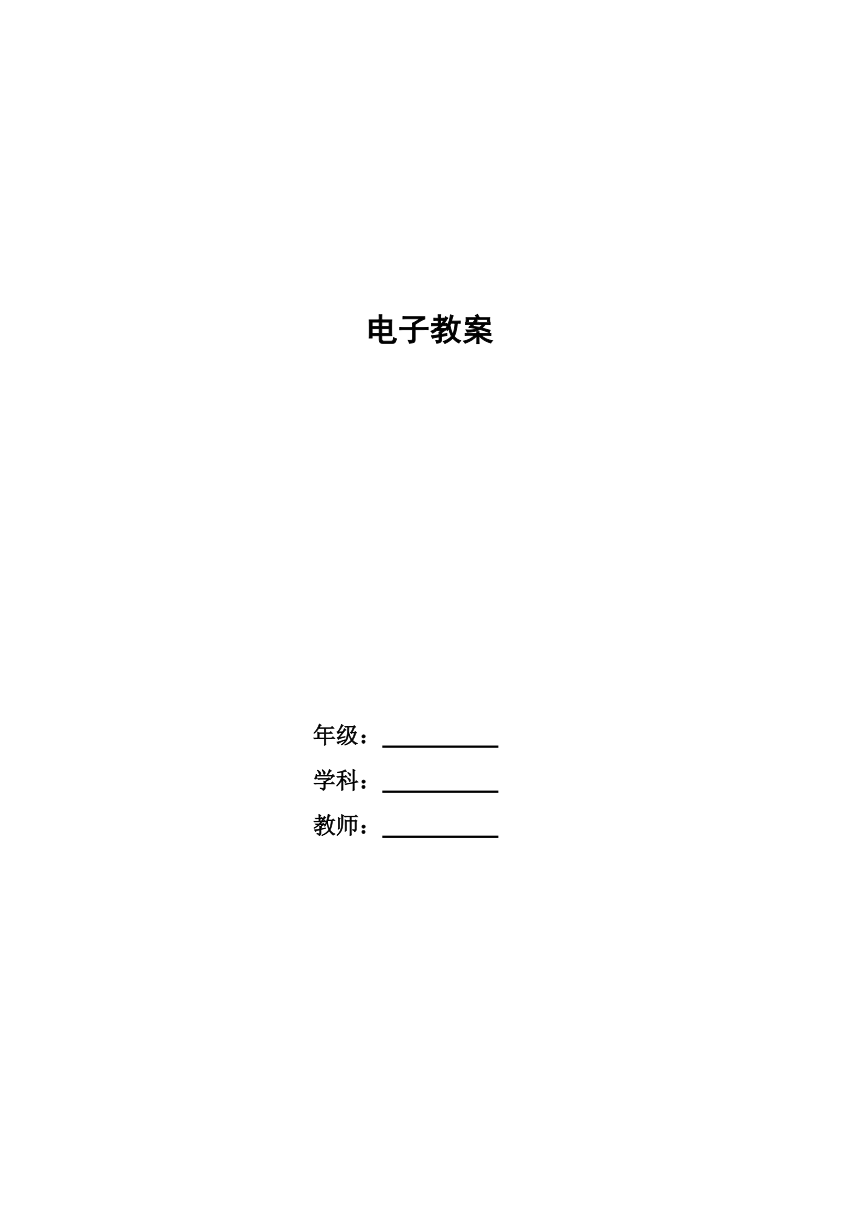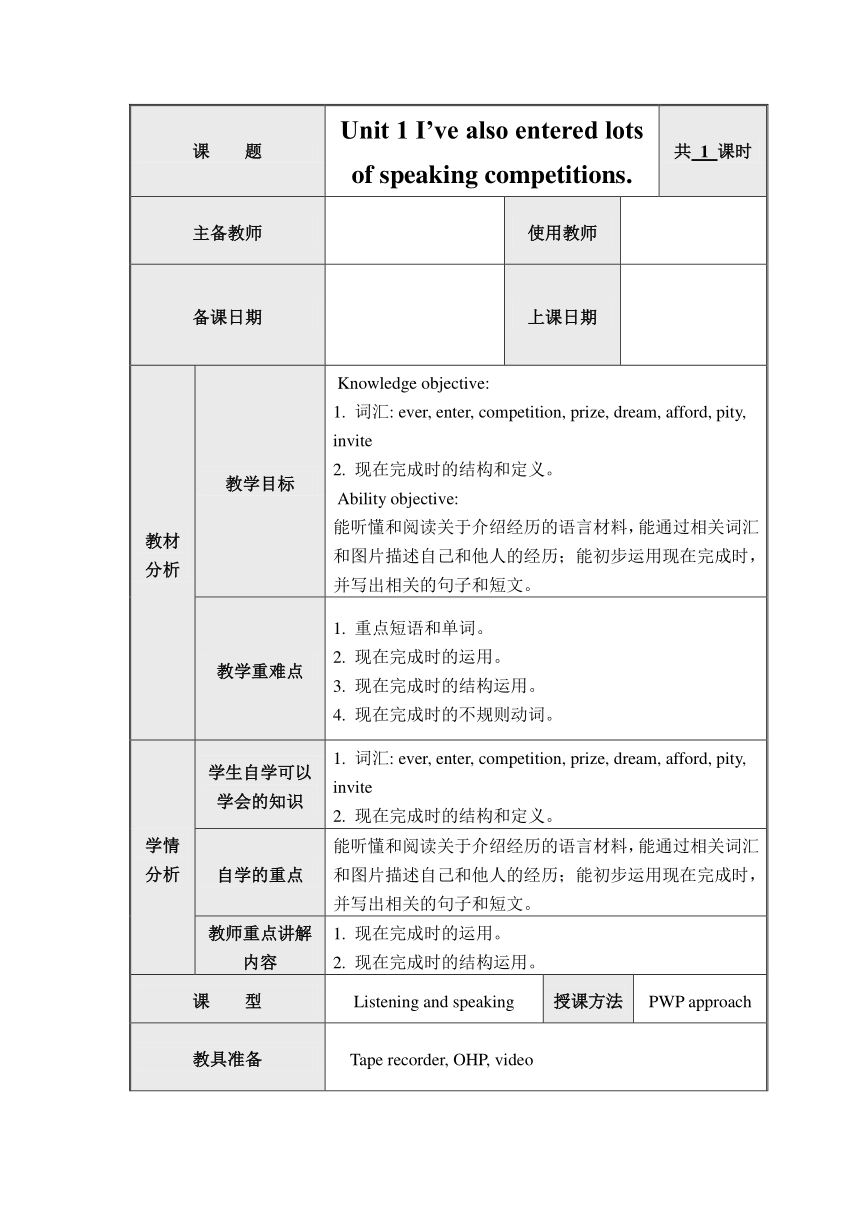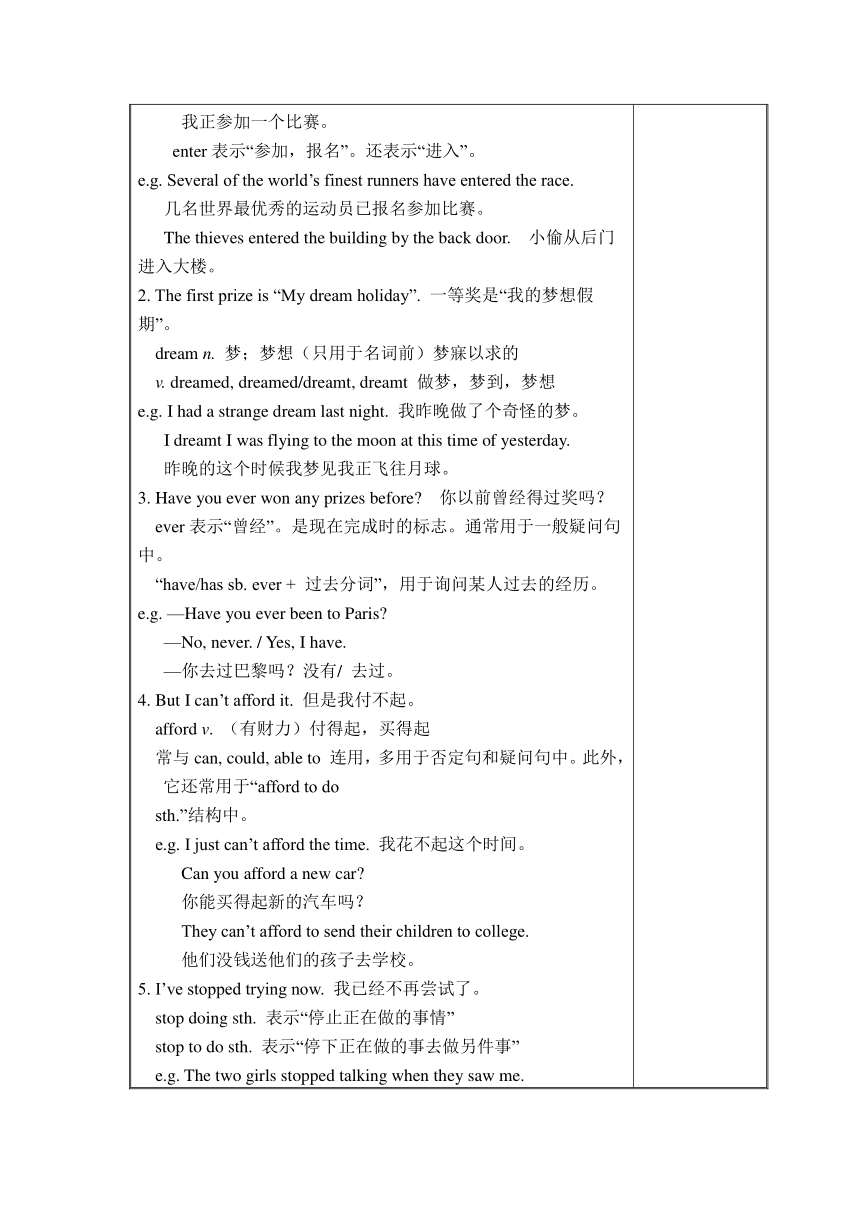Module 2 Experiences Unit 1 I ’ ve also entered lots of speaking competitions. 教案
文档属性
| 名称 | Module 2 Experiences Unit 1 I ’ ve also entered lots of speaking competitions. 教案 |  | |
| 格式 | zip | ||
| 文件大小 | 16.5KB | ||
| 资源类型 | 教案 | ||
| 版本资源 | 外研版 | ||
| 科目 | 英语 | ||
| 更新时间 | 2015-09-10 09:23:10 | ||
图片预览




文档简介
电子教案
年级:
学科:
教师:
课 题 Unit 1 I’ve also entered lots of speaking competitions. 共 1 课时
主备教师 使用教师
备课日期 上课日期
教材分析 教学目标 Knowledge objective:1. 词汇: ever, enter, competition, prize, dream, afford, pity, invite2. 现在完成时的结构和定义。Ability objective:能听懂和阅读关于介绍经历的语言材料,能通过相关词汇和图片描述自己和他人的经历;能初步运用现在完成时,并写出相关的句子和短文。
教学重难点 1. 重点短语和单词。2. 现在完成时的运用。3. 现在完成时的结构运用。4. 现在完成时的不规则动词。
学情分析 学生自学可以学会的知识 1. 词汇: ever, enter, competition, prize, dream, afford, pity, invite2. 现在完成时的结构和定义。
自学的重点 能听懂和阅读关于介绍经历的语言材料,能通过相关词汇和图片描述自己和他人的经历;能初步运用现在完成时,并写出相关的句子和短文。
教师重点讲解内容 1. 现在完成时的运用。2. 现在完成时的结构运用。
课 型 Listening and speaking 授课方法 PWP approach
教具准备 Tape recorder, OHP, video
教与学的设计 我的修改
Step 1 Lead-in : Warming up(营造氛围,导入新课)1. Ss watch the video and answer “What’s this video about ”2. Ss look the pictures and answer the questions.3. Look and say. The teacher shows the pictures of new words and let the students to say as quickly as possible.Step 2 The students can learn by themselves, and ask some questions about the study. (自主学习 提出疑问)A1 Listen and number the words as you hear themLook at the words first.Then listen to the tape and number the words.A2 Listen again and choose the correct answerLook at the three sentences carefully.Listen to the tape again and choose the correct answer.Step 3 The students can learn the main point with the help of the teacher, and solve the problems. (精讲点拨)A3 ReadingListen and read, then answer the two questions:1. What is Lingling entering 2. Who is going to enter the writing competition A4 Work in pair. 1. Work in group. Make a competition to find who can find out the most sentences which are the present perfect tense.2. Read Part 3 and check what Linging and Tony have or have not done.3. Work in pairs. Ask an answer questions about what Linging and Tony have or have not done.A5 Everyday English Master the main sentences in the passage.A6 Language points Ss should master the main points from the passage in Part 3. If possible, let the students to say at first. I am entering a competition. 我正参加一个比赛。 enter表示“参加,报名”。还表示“进入”。e.g. Several of the world’s finest runners have entered the race. 几名世界最优秀的运动员已报名参加比赛。 The thieves entered the building by the back door. 小偷从后门进入大楼。2. The first prize is “My dream holiday”. 一等奖是“我的梦想假期”。 dream n. 梦;梦想(只用于名词前)梦寐以求的v. dreamed, dreamed/dreamt, dreamt 做梦,梦到,梦想e.g. I had a strange dream last night. 我昨晚做了个奇怪的梦。 I dreamt I was flying to the moon at this time of yesterday. 昨晚的这个时候我梦见我正飞往月球。3. Have you ever won any prizes before 你以前曾经得过奖吗? ever表示“曾经”。是现在完成时的标志。通常用于一般疑问句中。 “have/has sb. ever + 过去分词”,用于询问某人过去的经历。e.g. —Have you ever been to Paris —No, never. / Yes, I have. —你去过巴黎吗?没有/ 去过。4. But I can’t afford it. 但是我付不起。 afford v. (有财力)付得起,买得起 常与can, could, able to 连用,多用于否定句和疑问句中。此外,它还常用于“afford to do sth.”结构中。e.g. I just can’t afford the time. 我花不起这个时间。 Can you afford a new car 你能买得起新的汽车吗?They can’t afford to send their children to college.他们没钱送他们的孩子去学校。 5. I’ve stopped trying now. 我已经不再尝试了。stop doing sth. 表示“停止正在做的事情”stop to do sth. 表示“停下正在做的事去做另件事”e.g. The two girls stopped talking when they saw me. 那两个女孩一见到我就停止了讲话。 The two girls stopped to talk to me when they saw me. 那两个女孩一见到我就停下来和我讲话。6. You can make it up. 你可以编(一个故事)。 make up 表示“编造;组成”。e.g. The whole story is made up. 整个故事是虚构出来的。7. I will invite you to come with me. 我将邀请你和我一起来。 invite sb. to do sth. 表示“邀请某人去做某事”。e.g. Jane invited me to go fishing last week. 简上周邀请我去钓鱼了。A7 Complete the sentences with the correct form of the words in the box.Let the Ss complete the sentences with the words in the box and then check with each other.A8 Read and predict which words the speaker is likely to stress.Ss read and predict which words the speaker is likely to stress.Now listen and check if it is right.Work in pairs. Read the conversations aloud.--Have you ever wanted to travel around the world --Yes, I have. I’ve always wanted to travel around the world.--Have you ever visited New York --No, I haven’t. I’ve never visited the US.--Have you ever entered a competition --No, I haven’t. I haven’t entered any competitions.A9 Ask and answer. Work in pairs. Ask and answer questions about yourself.-Have you ever visited… -Yes, I have. /No, I haven’t. I’ve…Step 4 Effective practice, consolidate the knowledge(训练巩固)A10 Exercises写出过去分词。1. visit -- _______ 2. ask -- ______3. travel -- _______ 4. enter -- _______5. help -- _______ 6. win -- _____7. want -- _______ 8. stop -- _______9. think -- _______ 10. hope -- ______11. invite -- _______ 12. call -- _______ 选出最佳选项。1. Linging ______ written a story about the competition. A. have B. has C. is 2. I have ______ lots of speaking competitions, but I lost. A. helped B. stopped C. entered3. I want to buy a new bike, but I can’t _____ it. A. afford B. travel C. dream4. Li Ming joined the writing competition and won the _______ prize. A. one B. first C. two A11 中考链接让同学们直击中考,把握重难点。step 5 Summary evaluation, leak turnover(总结评价,查漏补缺)现在完成时现在完成时定义:强调过去发生的动作对现在造成的影响或结果。例如:Betty went to the park yesterday. (强调去公园的动作发生在昨天)Betty has been to the park before. (强调不仅去过公园,而且了解公园的状况)现在完成时的谓语结构:have/has + 动词的过去分词例如: I’ve always wanted to go on a dream holiday.句中的谓语结构为:have wantedLingling has visited the US.句中的谓语结构为:has visited规则动词过去分词的构成规则与规则动词过去式的构成规则相同。1. 动词一般在词尾加“-ed”。 e.g. work → worked → worked2. 以“e”结尾的动词,词尾加“-d”。 e.g. live → lived → lived3. 以“辅音字母+ y”结尾的动词,将“y”变为“i”,再加“-ed”。 e.g. study → studied → studied cry →cried → cried4. 以重读闭音节结尾,末尾只有一个辅音字母,先双写该辅音字母,再加“-ed”。 e.g. stop → stopped → stopped drop → dropped → dropped不规则动词的过去分词变化需特别记忆。
作业布置 1.copy the new words and expressions2.recite the text of the unit 1.3.finish the workbook4.recite the notes and exercise points.
板书设计 Unit 1 I’ve also entered lots of speaking competitions.ever, enter, competition, Structure:prize, dream, afford, have/has+donepity, invite
课后反思
年级:
学科:
教师:
课 题 Unit 1 I’ve also entered lots of speaking competitions. 共 1 课时
主备教师 使用教师
备课日期 上课日期
教材分析 教学目标 Knowledge objective:1. 词汇: ever, enter, competition, prize, dream, afford, pity, invite2. 现在完成时的结构和定义。Ability objective:能听懂和阅读关于介绍经历的语言材料,能通过相关词汇和图片描述自己和他人的经历;能初步运用现在完成时,并写出相关的句子和短文。
教学重难点 1. 重点短语和单词。2. 现在完成时的运用。3. 现在完成时的结构运用。4. 现在完成时的不规则动词。
学情分析 学生自学可以学会的知识 1. 词汇: ever, enter, competition, prize, dream, afford, pity, invite2. 现在完成时的结构和定义。
自学的重点 能听懂和阅读关于介绍经历的语言材料,能通过相关词汇和图片描述自己和他人的经历;能初步运用现在完成时,并写出相关的句子和短文。
教师重点讲解内容 1. 现在完成时的运用。2. 现在完成时的结构运用。
课 型 Listening and speaking 授课方法 PWP approach
教具准备 Tape recorder, OHP, video
教与学的设计 我的修改
Step 1 Lead-in : Warming up(营造氛围,导入新课)1. Ss watch the video and answer “What’s this video about ”2. Ss look the pictures and answer the questions.3. Look and say. The teacher shows the pictures of new words and let the students to say as quickly as possible.Step 2 The students can learn by themselves, and ask some questions about the study. (自主学习 提出疑问)A1 Listen and number the words as you hear themLook at the words first.Then listen to the tape and number the words.A2 Listen again and choose the correct answerLook at the three sentences carefully.Listen to the tape again and choose the correct answer.Step 3 The students can learn the main point with the help of the teacher, and solve the problems. (精讲点拨)A3 ReadingListen and read, then answer the two questions:1. What is Lingling entering 2. Who is going to enter the writing competition A4 Work in pair. 1. Work in group. Make a competition to find who can find out the most sentences which are the present perfect tense.2. Read Part 3 and check what Linging and Tony have or have not done.3. Work in pairs. Ask an answer questions about what Linging and Tony have or have not done.A5 Everyday English Master the main sentences in the passage.A6 Language points Ss should master the main points from the passage in Part 3. If possible, let the students to say at first. I am entering a competition. 我正参加一个比赛。 enter表示“参加,报名”。还表示“进入”。e.g. Several of the world’s finest runners have entered the race. 几名世界最优秀的运动员已报名参加比赛。 The thieves entered the building by the back door. 小偷从后门进入大楼。2. The first prize is “My dream holiday”. 一等奖是“我的梦想假期”。 dream n. 梦;梦想(只用于名词前)梦寐以求的v. dreamed, dreamed/dreamt, dreamt 做梦,梦到,梦想e.g. I had a strange dream last night. 我昨晚做了个奇怪的梦。 I dreamt I was flying to the moon at this time of yesterday. 昨晚的这个时候我梦见我正飞往月球。3. Have you ever won any prizes before 你以前曾经得过奖吗? ever表示“曾经”。是现在完成时的标志。通常用于一般疑问句中。 “have/has sb. ever + 过去分词”,用于询问某人过去的经历。e.g. —Have you ever been to Paris —No, never. / Yes, I have. —你去过巴黎吗?没有/ 去过。4. But I can’t afford it. 但是我付不起。 afford v. (有财力)付得起,买得起 常与can, could, able to 连用,多用于否定句和疑问句中。此外,它还常用于“afford to do sth.”结构中。e.g. I just can’t afford the time. 我花不起这个时间。 Can you afford a new car 你能买得起新的汽车吗?They can’t afford to send their children to college.他们没钱送他们的孩子去学校。 5. I’ve stopped trying now. 我已经不再尝试了。stop doing sth. 表示“停止正在做的事情”stop to do sth. 表示“停下正在做的事去做另件事”e.g. The two girls stopped talking when they saw me. 那两个女孩一见到我就停止了讲话。 The two girls stopped to talk to me when they saw me. 那两个女孩一见到我就停下来和我讲话。6. You can make it up. 你可以编(一个故事)。 make up 表示“编造;组成”。e.g. The whole story is made up. 整个故事是虚构出来的。7. I will invite you to come with me. 我将邀请你和我一起来。 invite sb. to do sth. 表示“邀请某人去做某事”。e.g. Jane invited me to go fishing last week. 简上周邀请我去钓鱼了。A7 Complete the sentences with the correct form of the words in the box.Let the Ss complete the sentences with the words in the box and then check with each other.A8 Read and predict which words the speaker is likely to stress.Ss read and predict which words the speaker is likely to stress.Now listen and check if it is right.Work in pairs. Read the conversations aloud.--Have you ever wanted to travel around the world --Yes, I have. I’ve always wanted to travel around the world.--Have you ever visited New York --No, I haven’t. I’ve never visited the US.--Have you ever entered a competition --No, I haven’t. I haven’t entered any competitions.A9 Ask and answer. Work in pairs. Ask and answer questions about yourself.-Have you ever visited… -Yes, I have. /No, I haven’t. I’ve…Step 4 Effective practice, consolidate the knowledge(训练巩固)A10 Exercises写出过去分词。1. visit -- _______ 2. ask -- ______3. travel -- _______ 4. enter -- _______5. help -- _______ 6. win -- _____7. want -- _______ 8. stop -- _______9. think -- _______ 10. hope -- ______11. invite -- _______ 12. call -- _______ 选出最佳选项。1. Linging ______ written a story about the competition. A. have B. has C. is 2. I have ______ lots of speaking competitions, but I lost. A. helped B. stopped C. entered3. I want to buy a new bike, but I can’t _____ it. A. afford B. travel C. dream4. Li Ming joined the writing competition and won the _______ prize. A. one B. first C. two A11 中考链接让同学们直击中考,把握重难点。step 5 Summary evaluation, leak turnover(总结评价,查漏补缺)现在完成时现在完成时定义:强调过去发生的动作对现在造成的影响或结果。例如:Betty went to the park yesterday. (强调去公园的动作发生在昨天)Betty has been to the park before. (强调不仅去过公园,而且了解公园的状况)现在完成时的谓语结构:have/has + 动词的过去分词例如: I’ve always wanted to go on a dream holiday.句中的谓语结构为:have wantedLingling has visited the US.句中的谓语结构为:has visited规则动词过去分词的构成规则与规则动词过去式的构成规则相同。1. 动词一般在词尾加“-ed”。 e.g. work → worked → worked2. 以“e”结尾的动词,词尾加“-d”。 e.g. live → lived → lived3. 以“辅音字母+ y”结尾的动词,将“y”变为“i”,再加“-ed”。 e.g. study → studied → studied cry →cried → cried4. 以重读闭音节结尾,末尾只有一个辅音字母,先双写该辅音字母,再加“-ed”。 e.g. stop → stopped → stopped drop → dropped → dropped不规则动词的过去分词变化需特别记忆。
作业布置 1.copy the new words and expressions2.recite the text of the unit 1.3.finish the workbook4.recite the notes and exercise points.
板书设计 Unit 1 I’ve also entered lots of speaking competitions.ever, enter, competition, Structure:prize, dream, afford, have/has+donepity, invite
课后反思
同课章节目录
- Module 1 Feelings and impressions
- Unit 1 It smells delicious.
- Unit 2 I feel nervous when I speak Chinese .
- Unit 3 Language in use
- Module 2 Experiences
- Unit 1 I've also entered lots of speaking competi
- Unit 2 They have seen the Pyramids.
- Unit 3 Language in use
- Module 3 Journey to space
- Unit 1 Has it arrived yet?
- Unit 2 We have not found life on any other planet
- Unit 3 Language in use
- Module 4 Seeing the docto
- Unit 1 I haven't done much exercise since I got m
- Unit 2 We have played football for a year now
- Unit 3 Language in use
- Module 5 Cartoons
- Unit 1 It's time to watch a cartoon.
- Unit 2 Tintin has been popular for over eighty yea
- Unit 3 Language in use
- Revision module A
- Module 6 Hobbies
- Unit 1 Do you collect anything ?
- Unit 2 Hobbies can make you grow as a person.
- Unit 3 Language in use
- Module 7 Summer in Los Angeles
- Unit 1 Please write to me and send me some photos
- Unit 2 Fill out a form and come to learn English
- Unit 3 Language in use
- Module 8 Time off
- Unit 1 I can hardly believe we are in the city ce
- Unit 2 We thought somebody was moving about
- Unit 3 Language in use
- Module 9 Friendship
- Unit 1 Could I ask if you've mentioned this to he
- Unit 2 I believe that the world is what you think
- Unit 3 Language in use
- Module 10 On the radio
- Unit 1 I hope that you can join us one day
- Unit 2 It seemed that they were speaking to me in
- Unit 3 Language in use
- Revision module B
